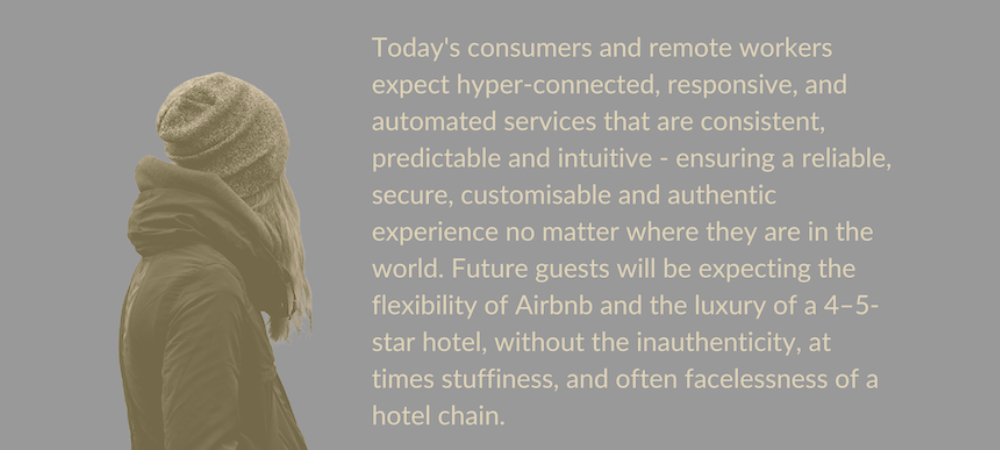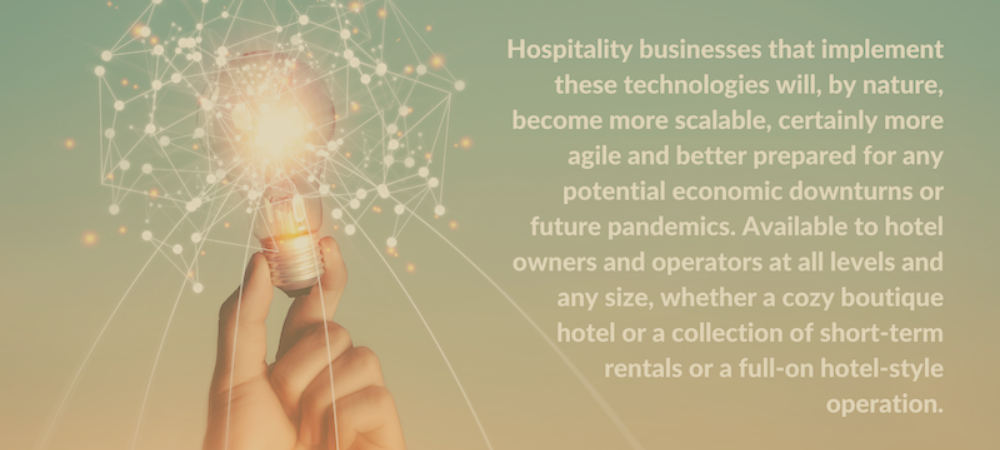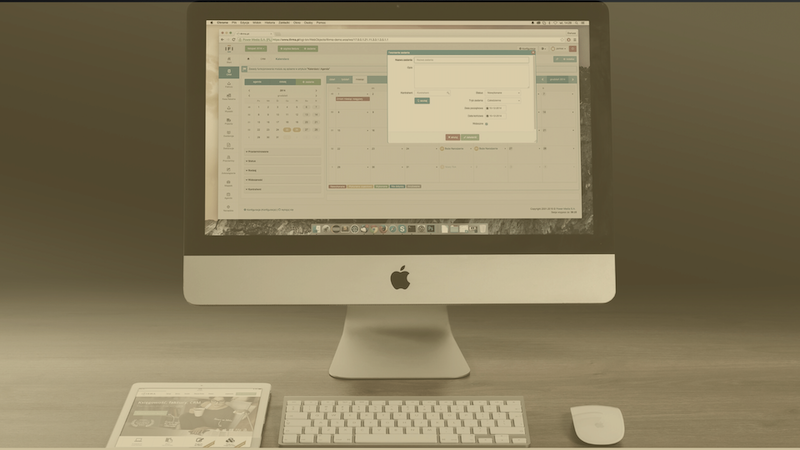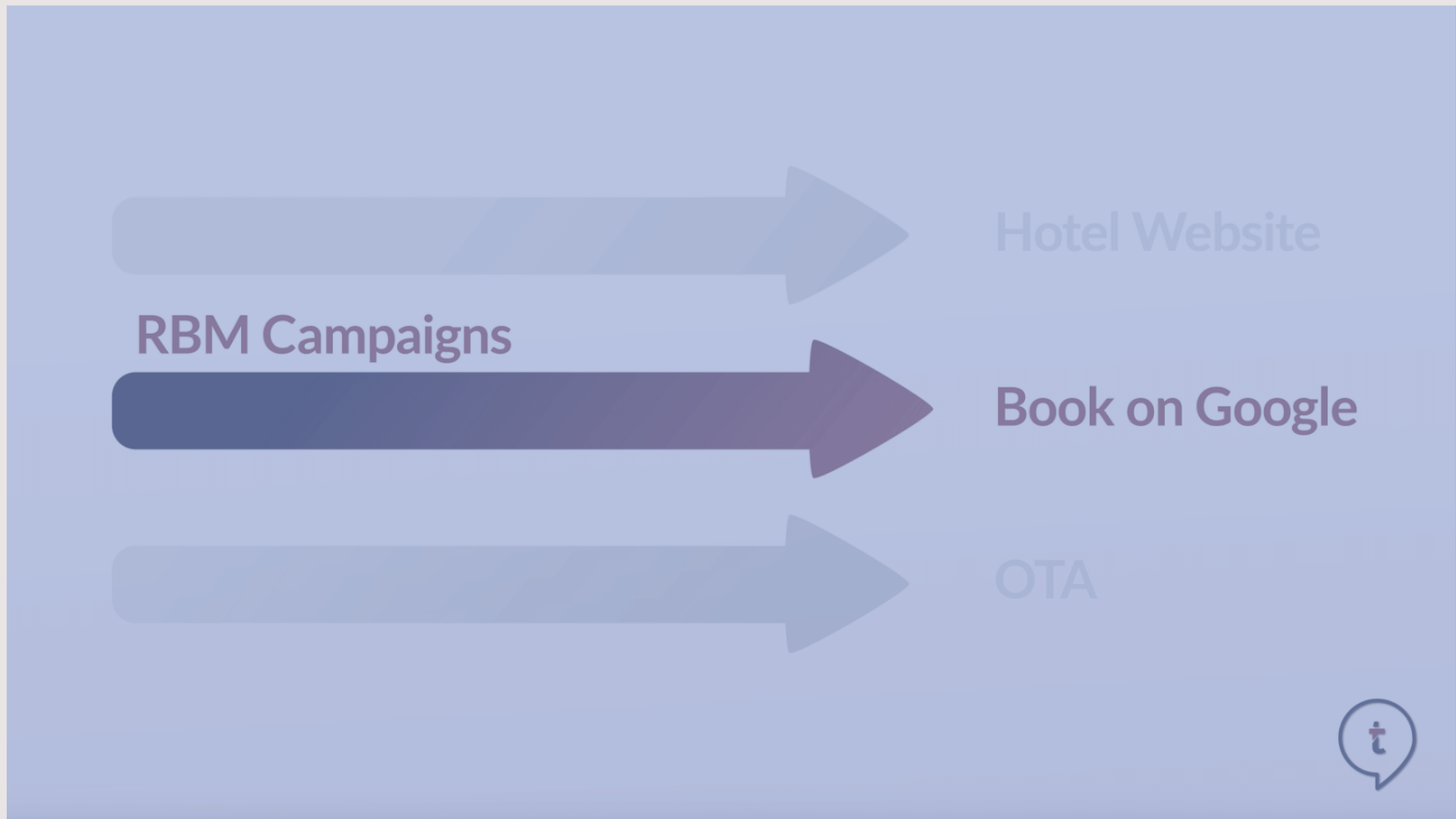Opportunities Hotels can apply from Alternative Accommodation's Use of Technology
Smart technology is changing how we interact with everything, from our homes to office and business environments. The hospitality industry is no exception. The hospitality industry is progressively adopting intelligent business technology into its tech stacks and operational ecosystems. After re- cent slumps in business due to COVID, the question should be asked if the industry is moving fast enough towards more automated and contactless technologies in preparation for the return of travel and guests, who will undoubtedly travel with a new set of perspectives and expectations.
Everything from the booking process, operations to guest experience to marketing, smart hotel technology can offer a variety of automation, meeting guest expectations, delivering cost savings and revenue opportunities, ultimately assisting hoteliers and operators in achieving efficiency in service levels and a return to profitability.
An interesting place to start would be taking a closer look at technology ideas from alternate accommodation providers such as OYO, Airbnb, and Sonder. Technology solutions should offer guests and managers a holistic, seamless, consistent experience that is easy to use, reliable, efficient, and scalable.
How can hotels build back their business and thrive operationally whilst dealing with the reality of the current growing labor shortage? Well, perhaps it’s the time now to turn to the Alternate Accommodation side of the industry and consider how they have been applying technology to their operations in recent years and thus seeing positive results

Adopting Technology Ideas from Alternative Accommodation
Technology solutions should offer guests and managers a holistic, seamless, consistent experience; they should be easy to use, reliable, efficient, and scalable.
Considering what will be most important to future guests traveling in a post COVID era and how hotels can stand out from their competition. Two of the top buzzwords for hotels are «digital transformation.» Like many others, we expect that hospitality will increasingly embrace complete digital transformation over the next few years, and quite likely with faster adoption of automation and new technology than historically with previous technologies.
We’ve seen prioritization on automation, keyless solutions, contactless mobile check-in, and check-out while seeking to use technology to minimize the need for guests to interact directly with the front desk.
This keeps costs low and provides quality customer experiences via the guest’s mobile device. It is possibly a significant way hotels will manage their daily operations with the current labor shortages.
It’s safe to say that contactless check-in does not equate to a cold, clinical, faceless, or overly techy experience for the guest or staff member - quite the opposite. Instead, hotels can focus on giving their guests a fantastic, friendly, safe, secure, and happy stay by engaging with them as the guest wants or is necessary.
Contactless check-in has not only been a large part of the modern, alternate accommodation experience. It’s been a significant factor of their success in recent years; it is showing to be accepted by the guest, if not preferred, so the time is now for traditional hotels to offer these options to their guests. For example, a 5-star luxury brand should keep their traditional check-in and out process in place if they believe a segment of their guests still wants it. They should also provide a contactless check-in option to those guests that might prefer that option.
Examples of digital solutions that can also make life easier for guests and staff by fully digitizing hotels while managing aspects of their operations remotely, if necessary, can include;
- The Booking Process
- Check-in/check-out
- Concierge Services
- Housekeeping
- Maintenance
- Automated Building Management
- Guest feedback and reviews
Guest Personalization
Just as guests want to check-in as soon as they arrive, with no waiting or needless interaction required, they also want to personalize their experience and feel they can tweak things as they prefer.
Seamless technology acts like self-service, al- lowing guests to arrive, changing the air conditioning and lighting levels to their liking. Automated personalized emails can be sent immediately after booking and communication with the concierge or staff once at the hotel, offering everything they need for their stay at their fingertips. Targeting guests’ needs by enabling staff to respond to concerns instantly, boosting customer satisfaction, and ensuring guests feel taken care of throughout their stay.
Do not overlook the Internet and Wi-Fi service as more people will be working on the road post-pandemic. Hotels that want to appeal to the increasing numbers of busy «bleisure» travelers need to offer reliable, super-fast internet access via stable Wi-Fi networks with easy access. Connecting on property experiences directly to the guest means they have access to and receive all the information they need during the stay directly to their devices. Examples can be available hotel facilities and services, a map of the local area, and recommendations for local restaurants, clubs, or bars.
It has been possible to offer guests complete control of in-room devices for some time now. Additionally, the ability to provide in-room upsells and voice-controlled devices are also possible. Conversely, industry-wide adoption of this has been slow, perhaps because this is not possible without smart devices and needed technology solutions that help manage them. Has it been a lack of willingness to implement this technology, or is it something else, funding, procurement, or knowledge? Perhaps a combination of all.
It is possible today for hotels to have the ability to oversee the entire process from check-in to check-out without having to be on-site or needing staff to wait around or be with guests in person and even remotely manage cleaning and maintenance schedules, reducing staff costs and unnecessary in-person contact. I’m not suggesting hotels should do this tomorrow; for many, it won’t be in line with their service offering and brand, but it could very well be an option to consider in many instances. Especially if needing to change their business model or product offering to meet the mo- dern travelers’ expectations in a post COVID world.
Through the use of technology such as smart hotel door locks and self-service check-in / out options, digital transformation is now possible for the smaller, independent, or boutique type of property. It is not exclusive to the large chains of the industry. Such properties can now offer this alternate accommodation operating model that might even include doing away with the front desk, offering instant check-in and check-out to guests, and working via interactive, digital devices. Why not?
Empowered by technology, hotels can still give guests a satisfying hotel experience at the same level (if not more so) as the more prominent global brands.
The guests would see greater efficiencies and receive assistance if needed elsewhere while the hotel streamlines operations and keeps costs to their optimum.
The most significant change we have seen recently in the industry is that these streamlined technologies are no longer for the exclusivity of the Hiltons or Marriotts of the world. You do not need a big brand on your door to benefit from this.
Staffing Challenges
Digitization and automation will undoubtedly help to maximize staff efficiency. Still, as we move out of the pandemic, hotels face the reality that re-hiring staff is difficult, so running their operations with less staff is unavoidable. The Key will be how they apply their technology to be a significant part of that process.
Alternative accommodation providers tend to remove the entire front desk experience by not having a physical front desk. This not only means they require fewer staff members but that they can offer a very streamlined, contact-free experience, which could be the difference between survival and getting left behind forever, as guests demand easier processes for lower costs. Fewer staff members in a more efficient, less cumbersome operation could bring lower costs and more profit without impacting the guest experience.
Synergies of Technology
Like any relationship, it takes two to make it work, and, in this case, it means ensuring the hardware used is being supported and working coherently with the right Software. Gone are the days when legacy on property solutions provide such options; everything we discuss in this article can only be above property cloud-based solutions with Software as a Service (SaaS) models in place. A growing number of technology solutions provided by forward-thinking companies are available that can help implement more automated and digitized solutions to help provide property automation and digitization for hotels interested in implementing a more «Alternate Accommodation» type of model.
Ultimately power lies with the hotelier keeping track of what's always going on in their property(s) while simplifying each stage of the process. Linking bookings, guests, staff, and intelligent devices through the primary hotel operating system with supporting interfaces. These systems enable hotels to maximize their properties' performance, save on energy and proactively work to improve revenue, all while continuing to provide the service and hospitality their guests expect.

Hospitality businesses that implement these technologies will, by nature, become more scalable, certainly more agile, and better prepared for any potential economic downturns or future pandemics. Available to hotel owners and operators at all levels and any size, whether a cozy boutique hotel or a collection of short-term rentals, or a full-on hotel-style operation.
Using automated Internet of Things (IoT) technology and connected solutions is not only the future of hospitality but quite simply the reality of everything we interact with within daily life. Regardless of the current state of a hotel’s systems or operation, they’ll start to see the power of connected technology and the ever-changing demands of modern travelers in a post-Covid world.
Today’s consumers and remote workers expect hyper-connected, responsive, and automated services that are consistent, predictable, and in- intuitive - ensuring a reliable, secure, customizable, and authentic experience no matter where they are in the world. Future guests will be expecting the flexibility of Airbnb and the luxury of a 4–5- star hotel, without the inauthenticity, at times stuffiness, and often facelessness of a hotel chain.
Technology is advancing to the point where no part of a trip or experience is without it, and hotels rarely operate without it. Artificial intelligence is used for pricing rooms, checking-in guests, online help, room service, and more. On the whole, technology makes it much easier to personalize the guest experience while recognizing and remembering their individual preferences.
Takeaways
- Technology is a driving force –It’s now a significant disadvantage not to be tech-led in a hotel’s business strategy.
- Many solutions within travel technology are available that offer to leverage artificial intelligence, voice technology, mobile technology, and much more.
- Generic or static hotels or hotel companies will struggle to survive in the post-COVID future unless they embrace automation, self-serve and contactless technologies.
- Smart rooms, green, eco-friendly hotels, domination of tech, intuitive hotel designs, and changing traveler priorities are all realities that must be taken seriously by all hotel operators and owners.
- Contactless, bleisure, and autonomous are three things that should never be far from a modern hotelier’s mind.
- Many solutions within travel technology are available that offer to leverage artificial intelligence, voice technology, mobile technology, and much more.
- Generic or static hotels or hotel companies will struggle to survive in the post-COVID future unless they embrace automation, self-serve and contactless technologies.
- Smart rooms, green, eco-friendly hotels, domination of tech, intuitive hotel designs, and changing traveler priorities are all realities that must be taken seriously by all hotel operators and owners.
- Contactless, bleisure, and autonomous are three things that should never be far from a modern hotelier’s mind.
About the Author
André Baljeu, Founder at techtalk.travel

André’s experience derives from a career spanning 30 years across the globe, with senior IT and operational positions with leading hotel chains and technology providers. André founded techtalk.travel in 2017 to help bridge the gap between hotels and technology providers. Offering an entry point for industry newcomers and students to better understand the industry landscape by providing a neutral, thought leadership platform delivering relevant, trusted, ad-free editorial content.
Connect with André on Linkedin.
Also, make sure to find these editorial content elements on the ALTERNATE ACCOMMODATION TECHNOLOGY
- PODCAST l Alternative Accommodation Learnings for Hotels ft. Rahul Sahni (OYO Vacation Homes), Hauke Lenthe (Nomadix), and Nicholas Kaye (QuantumNet)
- VIDEO l Technology learnings from Alternative Accommodation Providers
- INFOGRAPHIC l Technology applied by Alternate Accommodation Providers
EXPLORE FURTHER. Related editorials




 Free download
Free download

![V03: The History of Hotel & Travel Technology | [Updated] Infographic](https://www.techtalk.travel/storage/app/uploads/public/63f/e6f/ec8/63fe6fec80447817849943.jpg)



Create an account to access the content.
Get access to Articles, Video's, Podcasts, Think Tanks, Infographics and more.
Click “Sign In” to accept our
Terms of Service Privacy Policy